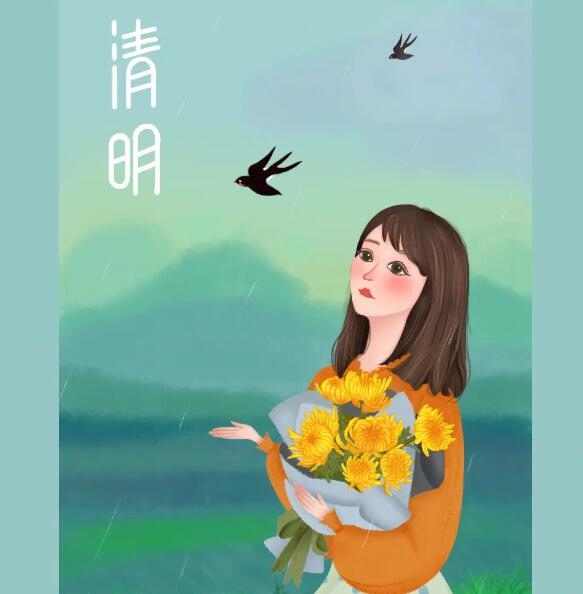关于“清明节”的英文介绍?
一、关于“清明节”的英文介绍?
Qingming Festival originated from ancestor belief and spring sacrifice custom in ancient times. It has two connotations of nature and humanity. It is not only a natural solar point, but also a traditional festival. 清明节源自上古时代的祖先信仰与春祭礼俗,兼具自然与人文两大内涵,既是自然节气点,也是传统节日。 Qingming Festival is a traditional major spring festival. Tomb-sweeping and ancestor-remembering is a fine tradition of the Chinese nation since ancient times. 清明节是传统的重大春祭节日,扫墓祭祀、缅怀祖先,是中华民族自古以来的优良传统。
二、清明节来历英文(简短)?
Last Qingming Festival,I return home to worship my grandfather.Qingming Festival is a folk Festival.In the past,the Qingming Festival was called “Arbor Day”。 But Today, Chinese visit their family graves to tend to any underbrush that has grown. Weeds are pulled, and dirt swept away, and the family will set out offerings of food and spirit money. Unlike the sacrifices at a family"s home altar, the offerings at the tomb usually consist of dry, bland food. One theory is that since any number of ghosts rome around a grave area, the less appealing food will be consumed by the ancestors, and not be plundered by strangers. With the passing of time, this celebration of life became a day to the honor past ancestors. Following folk religion, the Chinese believed that the spirits of deceased ancestors looked after the family. Sacrifices of food and spirit money could keep them happy, and the family would prosper through good harvests and more children.望能采纳~亲
三、用英文介绍清明节?
中国清明节的英文介绍:
Brief introduction to the Qingming Festival:
The Qingming or Ching Ming Festival, also known as Tomb-Sweeping Day in English, is a traditional Chinese festival on the first day of the fifth solar term of the traditional Chinese lunisolar calendar. This makes it the 15th day after the Spring Equinox, either 4 or 5 April in a given year.
Qingming has been regularly observed as a statutory public holiday in China. It became a public holiday in China in 2008.
The holiday is associated with the consumption of qingtuan, green dumplings made of glutinous rice and barley grass.
Origin of the Qingming Festival:
The festival originated from the Cold Food Festival ("Hanshi Festival"), established by Chong"er, Duke Wen of Jin, during the Spring and Autumn period. The festival was a memorial for his retainer Jie Zitui,who had loyally followed him during his years of exile. Supposedly, heonce even cut meat from his own thigh to provide Chong"er with soup.Once Chong"er was enthroned as duke, however, Jie considered hisservices no longer required and resigned. Although Duke Wen was generousin rewarding those who had helped him in his time of need, he longpassed over Jie, who had moved into the forest with his mother. Duke Wenwent to the forest in 636 BCbut could not find them. He then ordered his men to set fire to theforest in order to force Jie out. When Jie and his mother were killedinstead, the duke was overcome with remorse and ordered three dayswithout fire to honor Jie"s memory. The city erected over the formerforest is still called Jiexiu (lit. "Jie"s rest").
The Qingming Festival in literature:
Qingming was frequently mentioned in Chinese literature. Among these, the most famous one is probably Du Mu"s poem (simply titled "Qingming"):
四、清明节的时间用英文缩写?
清明节(别称:踏青节,英文名:Tomb-Sweeping Day)是中国最重要的祭祀节日,日期一般在公历4月5日。
五、怎么写清明节的英文古诗?
《清明》 (唐)杜牧 清明时节雨纷纷,路上行人欲断魂。
借问酒家何处有?牧童遥指杏花村。"Qingming"(down) hisQingming Festival have rain, pedestrians on the road.Borrows asked wineshop where has? The shepherd boy points at Xinghuacun.
六、清明节英文怎么说?
清明节:Tomb-Sweeping Day或者Qing Ming Festival
作为节日和节气的清明节,它们的英文说法是不同的。
作为节日的清明节一般翻译为“Tomb Sweeping Festival”或者“Tomb-sweeping Day”,扫墓节或扫墓日。这个翻译着重强调了清明节的重要习俗“扫墓”。这种说法的好处是,老外一听就能大概明白这个节日的背后含义。
再谈到作为节气的清明,它被译为“Clear and Bright”,清洁和明亮。我们也不难发现,这种译法强调的是清明时节的气候状况,和其他节气的翻译出发点一致。比如立夏被译为“Summer begins”、小寒、大寒分别被译为“Slight cold”和“Great cold”。
清明是二十四节气之一,在仲春与暮春之交,也就是冬至后的第108天。中国汉族传统的清明节大约始于周代,距今已有二千五百多年的历史。
七、英文的关于清明节的演讲稿?
以下是一份英文的清明节演讲稿,供参考:
Ladies and gentlemen,
Today, we gather here to pay our respects to our ancestors and loved ones who have passed away. It is the Qingming Festival, also known as Tomb Sweeping Day, which is a traditional Chinese holiday that is observed on April 4th or 5th every year.
This day is not only a time for mourning and remembrance but also a time for us to reflect on our lives and cherish the memories of our loved ones. We come here to sweep the tombs, offer incense, and burn paper money to pay tribute to our ancestors and express our gratitude for their contributions to our lives.
The tradition of Qingming Festival dates back over 2,500 years, and it is a part of Chinese culture that has been passed down from generation to generation. It is a time when families come together to honor their ancestors and strengthen their bonds with one another.
As we remember our loved ones, we should also take a moment to reflect on our own lives. We should cherish the time we have with our family and friends, and we should strive to live our lives to the fullest, just as our ancestors did.
Let us use this time to remember our loved ones, to honor their memories, and to strengthen our bonds with our families and friends. And let us all strive to live our lives with purpose and meaning, just as our ancestors did.
Thank you.
八、清明节的来历英文版简短20字?
Qingming is also called the festival folklore is in commemoration of spring autumn food Jie Zitui was burned to Mianshan, Duke Wen ordered the ban on fire.
九、清明节是干啥的?
清明节是祭奠已故的人,去踏青扫墓。
十、清明节是干嘛的?
清明,是二十四节气之一,春季的第五个节气。斗指乙,太阳到达黄经15°,便为清明。清明节气因为节令期间“气清景明、万物皆显”而得名。清明是反映自然界物候变化的节气,这个时节阳光明媚、草木萌动、百花盛开,自然界呈现一派生机勃勃的景象。中国南方地区,此时已呈气清景明之象;北方地区开始断雪,气温上升,春意融融。
清明一般在公历4月4日至6日之间变动,并不固定在某一天,但以4月5日最常见。清明既是节气又是节日,清明节气在时间和天气物候特点上为清明节俗的形成提供了重要条件。清明节气,与岁时物候相关,常以指导农事,有天朗气清、春耕时宜之意;清明节日,是人们扫墓祭祖、慎终追远的日子;因为二者相融,让清明兼具自然和人文内涵。

